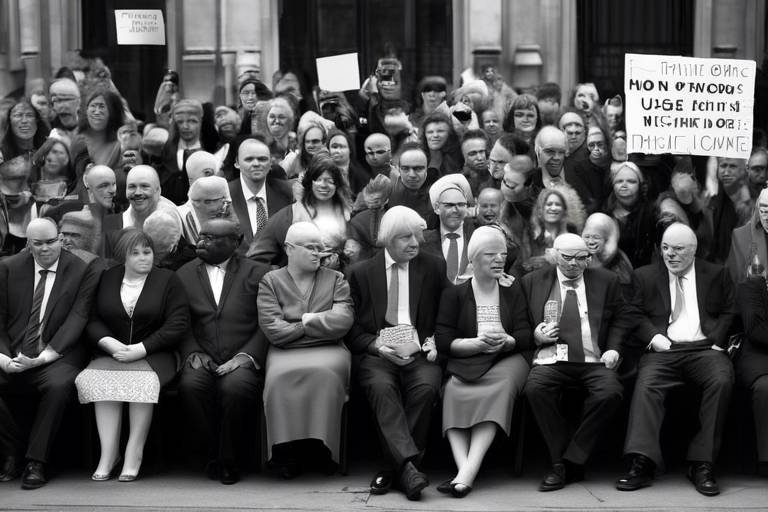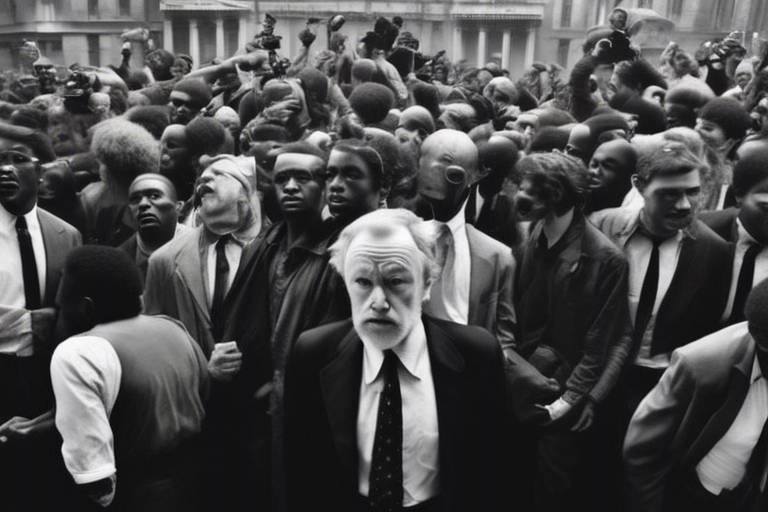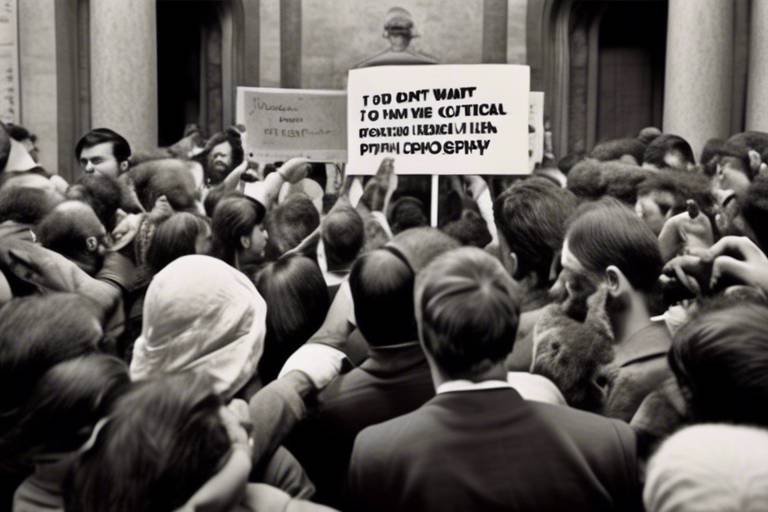How Philosophy Shapes Our Views on Discrimination
Philosophy, at its core, is about questioning the world around us. It invites us to ponder the fundamental principles that govern our lives, including how we perceive and address discrimination. Discrimination is not merely a social issue; it is a profound moral dilemma that challenges our understanding of justice, equality, and human dignity. Through the lens of philosophical inquiry, we can dissect the complexities of discrimination and explore its implications in various contexts. This exploration is not just academic; it resonates with our everyday experiences and interactions. Have you ever wondered why some forms of discrimination are more readily accepted than others? Or how our ethical frameworks can either perpetuate or challenge these injustices? By diving into the philosophical underpinnings of discrimination, we can better understand the societal norms that shape our behaviors and beliefs.
The intersection of philosophy and discrimination is rich and multifaceted. It compels us to confront uncomfortable truths about power dynamics and societal structures. For instance, consider how ethical theories influence our views on discrimination. Are we guided by the outcomes of our actions, the inherent rights of individuals, or the virtues we aspire to embody? Each philosophical approach offers unique insights, prompting us to reflect on our moral responsibilities toward others, especially those who are marginalized. In this article, we will delve into various philosophical theories, historical perspectives, and contemporary debates surrounding discrimination, aiming to illuminate the path toward greater understanding and social justice.
In our journey, we will examine how ethical frameworks such as consequentialism, deontology, and virtue ethics inform our perceptions of discrimination. Each framework provides a different lens through which we can analyze our moral obligations and the impact of our actions on others. Moreover, we will explore historical perspectives that have shaped our current views on equality and justice, highlighting key figures and movements that have fought against discrimination throughout history. By understanding these philosophical foundations, we can engage in more informed discussions about discrimination and work towards creating a more equitable society.
Ethics serves as the backbone of our moral judgments and actions, especially when it comes to discrimination. It provides the frameworks that help us navigate the murky waters of right and wrong. Let's take a closer look at three major ethical theories: consequentialism, deontology, and virtue ethics.
Utilitarianism, a consequentialist theory, posits that the best action is the one that maximizes overall happiness or well-being. In the context of discrimination, this raises intriguing questions. For example, does the pursuit of the greatest good for the greatest number justify discriminatory practices against minority groups? This ethical dilemma is at the heart of many policy discussions. Are we willing to sacrifice the rights and dignity of a few for the perceived benefit of the majority? This section will delve into how utilitarian principles impact discrimination policies and practices.
While utilitarianism offers valuable insights, it is not without its critiques. Critics argue that this approach can lead to justifications for discrimination against minorities, as their suffering might be overlooked in favor of maximizing overall happiness. This raises essential questions about the limitations of utilitarian reasoning in promoting true equality. We must ask ourselves: can we truly measure happiness and suffering in such a way that it justifies the marginalization of certain groups?
Despite its critiques, utilitarianism can still propose viable solutions to combat discrimination. By focusing on policies that aim to maximize overall welfare, we can create frameworks that not only address discriminatory practices but also enhance the well-being of marginalized communities. This section will explore practical applications of utilitarian principles in fighting discrimination, emphasizing that ethical theories can indeed inform positive change.
In contrast to utilitarianism, deontological ethics emphasizes duties and rights. This perspective insists that individuals have inherent dignity that must be respected, regardless of the consequences. Deontological approaches challenge us to consider the moral implications of our actions, urging us to uphold the rights of all individuals, particularly those who are vulnerable to discrimination. This section will discuss how this ethical framework can guide our understanding of justice and equality.
Different philosophical theories of justice, such as Rawlsian justice, provide valuable frameworks for understanding and addressing discrimination. John Rawls' principles advocate for fairness and equality, presenting a compelling argument against discriminatory practices. His ideas challenge us to think critically about the structures that perpetuate inequality and injustice. This section will explore how Rawls' theories can be applied to contemporary issues, encouraging us to envision a more just society.
Feminist philosophy critiques traditional philosophical frameworks by emphasizing the importance of gender in discussions of discrimination. It reshapes our understanding of equality and justice by highlighting the unique challenges faced by women and marginalized genders. This section will delve into how feminist thought not only enriches our philosophical discourse but also informs practical approaches to combating discrimination in various forms.
- What is the main focus of philosophical discussions on discrimination?
Philosophical discussions on discrimination primarily focus on understanding the ethical implications of discriminatory practices and how various ethical frameworks can inform our responses to injustice. - How can philosophy help in combating discrimination?
Philosophy provides critical insights into our moral responsibilities, guiding us toward more equitable policies and practices that respect the dignity of all individuals. - What role do historical perspectives play in contemporary discussions on discrimination?
Historical perspectives highlight the evolution of thought regarding equality and justice, informing current debates and helping us learn from past mistakes.

The Role of Ethics in Discrimination
When we dive into the realm of ethics, we uncover profound insights that shape our understanding of discrimination. Ethics serves as a guiding compass, helping us navigate the murky waters of moral judgments and social norms. At its core, ethical theories provide frameworks that influence our perceptions of justice and equality. But how do these theories play out in real-life scenarios involving discrimination? Let’s break it down.
First, we have consequentialism, which focuses on the outcomes of our actions. This theory posits that the morality of an action is determined by its consequences. In the context of discrimination, this raises significant questions: Do the ends justify the means? If a policy benefits the majority but harms a minority, is it still ethical? Here, the challenge lies in balancing the greater good with the rights of individuals. For instance, a policy that promotes economic growth might inadvertently discriminate against marginalized communities. The ethical dilemma becomes whether we can accept such collateral damage in pursuit of overall benefits.
Next, we encounter deontology, which emphasizes duties and rights over the consequences of actions. Deontological ethics argues that every individual has inherent rights that must be respected, regardless of the outcomes. This perspective is crucial in discussions about discrimination because it underscores the importance of treating everyone with dignity. For example, if a practice systematically excludes a particular group, deontological ethics would argue that this is inherently wrong, regardless of any potential benefits that might accrue to others. It’s like saying, “You can’t throw someone under the bus, even if it helps the bus driver get to their destination faster.”
Then there's virtue ethics, which focuses on the character of the moral agent rather than specific actions or rules. This approach encourages individuals to develop virtues such as empathy, fairness, and respect. In the context of discrimination, virtue ethics prompts us to ask: What kind of person do we want to be? It emphasizes the importance of cultivating a society where virtues are valued, leading to a more inclusive environment. When we act from a place of virtue, we are less likely to engage in discriminatory practices because our character drives us to uphold justice and equality.
To illustrate these ethical theories, let’s consider a table that summarizes their key features in relation to discrimination:
| Ethical Theory | Focus | Application to Discrimination |
|---|---|---|
| Consequentialism | Outcomes of actions | Questions if the benefits to the majority justify harm to minorities |
| Deontology | Duties and rights | Emphasizes the inherent dignity of every individual |
| Virtue Ethics | Character of the moral agent | Encourages the development of virtues that promote inclusivity |
In conclusion, the role of ethics in understanding discrimination cannot be overstated. Each ethical framework offers unique insights that help us grapple with the complexities of justice and equality. By examining these theories, we not only sharpen our moral compass but also empower ourselves to challenge discriminatory practices. So, the next time you encounter a situation involving discrimination, consider the ethical implications at play. Are we prioritizing outcomes, respecting rights, or cultivating virtues? The answers can guide us toward a more equitable society.
- What is the main focus of consequentialism? Consequentialism focuses on the outcomes of actions, assessing their morality based on the results they produce.
- How does deontology differ from consequentialism? Deontology emphasizes duties and rights, arguing that certain actions are inherently right or wrong, regardless of their consequences.
- What role does virtue ethics play in discussions of discrimination? Virtue ethics encourages individuals to develop character traits that promote fairness and respect, leading to more inclusive actions.

Historical Perspectives on Discrimination
Throughout history, the concept of discrimination has been shaped by various philosophical thoughts and movements, each contributing to our contemporary understanding of justice and equality. Philosophers have long debated the moral implications of treating individuals differently based on characteristics such as race, gender, and socioeconomic status. This ongoing discourse has significantly influenced societal norms and laws surrounding discrimination. For instance, the Enlightenment era brought forth ideas of individual rights and equality, challenging the status quo and advocating for the inherent worth of every person. Thinkers like John Locke argued that all individuals possess natural rights, laying the groundwork for future discussions on equality.
As we delve deeper into history, we encounter pivotal moments and figures that have shaped the discourse on discrimination. The abolitionist movement in the 19th century, driven by moral and ethical arguments against slavery, showcased how philosophical principles could mobilize societies towards justice. Similarly, the suffragette movement highlighted the intersection of gender and discrimination, as women fought for their right to vote, emphasizing that equality should transcend gender norms. The contributions of philosophers like Mary Wollstonecraft and later, Simone de Beauvoir, played a crucial role in challenging the patriarchal structures that perpetuated gender discrimination.
In the 20th century, the civil rights movement in the United States marked a significant turning point. Figures such as Martin Luther King Jr. and Malcolm X utilized philosophical arguments rooted in justice and equality to advocate for the rights of African Americans. Their speeches and writings emphasized the moral imperative to eliminate discrimination, drawing on the philosophical traditions of both utilitarianism and deontology. The struggle against apartheid in South Africa, led by figures like Nelson Mandela, also reflected a deep philosophical commitment to justice, showcasing how discriminatory practices could be dismantled through collective action and moral reasoning.
Moreover, the rise of postcolonial theory in the late 20th century brought forth critical perspectives on discrimination, particularly regarding race and ethnicity. Philosophers like Frantz Fanon examined the psychological and social impacts of colonialism, arguing that discrimination is not just a legal issue but a deeply ingrained societal problem. This perspective opened up new avenues for understanding how historical injustices continue to affect marginalized communities today.
In summary, the historical perspectives on discrimination reveal a rich tapestry of philosophical thought that has evolved over centuries. Each movement and figure contributed to a deeper understanding of equality, justice, and human rights, challenging societies to reflect on their values and practices. As we continue to grapple with issues of discrimination today, it is essential to recognize the philosophical underpinnings that have shaped our views and to strive for a more just and equitable society.
- What is the main focus of historical perspectives on discrimination?
Historical perspectives on discrimination focus on how philosophical thoughts and movements have influenced our understanding of justice and equality over time. - Who are some key figures in the fight against discrimination?
Key figures include John Locke, Mary Wollstonecraft, Martin Luther King Jr., and Nelson Mandela, among others, who have contributed significantly to discussions on equality and justice. - How has philosophy influenced modern views on discrimination?
Philosophy has provided frameworks for understanding discrimination, guiding moral judgments and actions, and shaping societal norms and laws.

Utilitarianism and Its Implications
Utilitarianism, at its core, is all about maximizing happiness and minimizing suffering. This ethical theory, championed by thinkers like Jeremy Bentham and John Stuart Mill, operates on the principle of the "greatest good for the greatest number." But what does this mean when we consider the complex issue of discrimination? Imagine a scale where the well-being of the majority is weighed against the rights and dignity of marginalized groups. In theory, utilitarianism sounds noble, but in practice, it raises profound questions about whose happiness counts and whose does not.
When we apply utilitarian principles to discriminatory practices, we often find ourselves in a moral quandary. For instance, a policy that benefits a large group might inadvertently harm a minority. This is where the implications of utilitarianism become particularly troubling. Should the happiness of the majority justify the suffering of a few? This dilemma forces us to reconsider how we define "the greatest good." Are we merely counting heads, or are we also considering the quality of life for those who might be left behind?
Utilitarianism's focus on outcomes can lead to policies that overlook the rights of individuals. For example, if a government decides to implement a law that benefits a majority demographic while disadvantaging a minority, it may argue that the law is justified because it serves a greater number of people. However, this approach can perpetuate systemic discrimination and social injustice. It’s crucial to recognize that utilitarianism, while aiming for collective happiness, can sometimes turn a blind eye to the suffering it causes.
Despite these critiques, utilitarianism can offer solutions to combat discrimination, if applied thoughtfully. For instance, policies designed to uplift marginalized groups can be framed as beneficial for society as a whole. By investing in education, healthcare, and job opportunities for underrepresented populations, we not only enhance their well-being but also contribute to a more stable and productive society. In this way, a utilitarian approach can align with efforts to promote equality and justice.
Let’s consider a practical example: implementing affirmative action policies. These policies aim to rectify historical injustices faced by minority groups. From a utilitarian perspective, one could argue that such measures lead to a more equitable society, which in turn benefits everyone by fostering social stability and economic growth. However, the challenge remains in balancing the immediate benefits to the majority with the long-term goals of justice and equality.
In essence, while utilitarianism provides a framework for evaluating the consequences of our actions, it also requires us to engage in a deeper analysis of what constitutes true happiness and well-being. It's not just about numbers; it’s about the stories behind those numbers. As we navigate the complexities of discrimination, we must ask ourselves: how can we ensure that the pursuit of the greater good does not come at the expense of the most vulnerable among us?

Critiques of Utilitarianism
Utilitarianism, while a powerful ethical framework, is not without its critics. One of the most significant critiques revolves around its potential to justify discrimination against minority groups. Imagine a scenario where the happiness of the majority is prioritized at the expense of a marginalized community. This raises a fundamental question: can we truly claim to uphold justice if the rights of individuals are sacrificed for the greater good?
Critics argue that utilitarianism simplifies complex moral dilemmas into a mere calculation of pleasure versus pain, often overlooking the intrinsic value of individual rights. For instance, if a policy benefits 90% of the population but harms a small group, utilitarianism may deem it acceptable. This utilitarian calculus can lead to troubling outcomes where the suffering of a few is overshadowed by the happiness of many. The moral implications of such decisions can be devastating, as they may perpetuate systemic inequalities.
Moreover, utilitarianism can be criticized for its reliance on quantitative measures of happiness. How do we measure happiness? Is it through wealth, health, or social status? This ambiguity can lead to subjective interpretations, which may vary drastically among different cultures and societies. For example, a policy that increases overall happiness in one demographic might simultaneously marginalize another, raising ethical concerns about fairness and justice.
Another critique focuses on the potential for utilitarianism to promote a 'tyranny of the majority.' This concept suggests that the majority's interests can overshadow the rights of minorities, leading to a societal structure where discrimination becomes normalized. To illustrate, consider a hypothetical society where a majority group enacts laws that favor their interests while systematically oppressing a minority. In such cases, utilitarian principles could inadvertently reinforce discriminatory practices rather than dismantle them.
In light of these critiques, it becomes essential to explore alternative ethical frameworks that prioritize individual rights and dignity. While utilitarianism can provide valuable insights into collective welfare, it must be complemented by a robust understanding of justice that safeguards against the marginalization of vulnerable populations.
- What is utilitarianism? Utilitarianism is an ethical theory that advocates for actions that maximize overall happiness or well-being.
- Why is utilitarianism criticized? Critics argue it can justify discrimination against minorities and oversimplify complex moral issues.
- How does utilitarianism relate to discrimination? It may prioritize the happiness of the majority over the rights of individuals, potentially leading to unjust outcomes.
- What are alternatives to utilitarianism? Deontological ethics and virtue ethics are examples of frameworks that emphasize individual rights and moral duties.

Utilitarian Solutions to Discrimination
Utilitarianism, with its core principle of seeking the greatest good for the greatest number, provides a unique lens through which to examine and address discrimination. At first glance, this ethical framework might seem to prioritize the majority's needs over those of marginalized groups. However, when applied thoughtfully, utilitarianism can offer pragmatic solutions that aim to uplift those who are often overlooked in societal decision-making processes.
One of the most compelling aspects of utilitarianism is its flexibility. It encourages policymakers and stakeholders to consider the broader impacts of their decisions, which can lead to innovative strategies for reducing discrimination. For example, implementing affirmative action policies can be viewed through a utilitarian lens as a means to enhance overall societal welfare. By providing opportunities to historically disadvantaged groups, society as a whole benefits from increased diversity, creativity, and economic productivity.
Moreover, utilitarianism prompts us to evaluate the long-term consequences of discriminatory practices. For instance, consider the impact of systemic racism on economic growth. Discrimination not only harms individuals but also stifles potential contributions to society. By recognizing that a more inclusive society can lead to greater innovation and economic prosperity, utilitarianism supports policies that dismantle such barriers. In this way, it becomes clear that addressing discrimination is not just a moral obligation but also a practical necessity for societal advancement.
Another avenue through which utilitarianism can address discrimination is through education and awareness campaigns. By investing in programs that promote understanding and acceptance among different groups, we can foster a more cohesive society. The benefits of such initiatives can be significant, as they often lead to reduced tensions and increased social harmony, ultimately benefiting everyone involved. This aligns with the utilitarian goal of maximizing happiness and minimizing suffering.
However, it is crucial to acknowledge the potential pitfalls of a purely utilitarian approach. Critics argue that focusing solely on the majority's happiness can lead to the neglect of minority rights. To mitigate this risk, a balanced approach is essential—one that considers both the utilitarian perspective and the inherent dignity and rights of individuals. By integrating these viewpoints, we can develop solutions that not only maximize welfare but also uphold justice and equality.
In summary, while utilitarianism has its challenges, it also offers valuable insights and solutions for combating discrimination. By emphasizing the importance of inclusivity and long-term societal benefits, utilitarian principles can guide us toward a more equitable future. As we navigate the complexities of discrimination, it is vital to harness the strengths of utilitarianism while remaining vigilant about the rights and dignity of all individuals.
- What is utilitarianism? Utilitarianism is an ethical theory that suggests the best action is the one that maximizes overall happiness or welfare.
- How does utilitarianism relate to discrimination? Utilitarianism can provide frameworks for addressing discrimination by focusing on policies that promote the greatest good for all, including marginalized groups.
- What are some examples of utilitarian solutions to discrimination? Examples include affirmative action, educational programs promoting diversity, and policies aimed at reducing systemic barriers to equality.
- What are the criticisms of utilitarianism in the context of discrimination? Critics argue that utilitarianism can overlook the rights of minorities by prioritizing the happiness of the majority, potentially justifying discriminatory practices.

Deontological Ethics and Rights
Deontological ethics, often associated with the philosophy of Immanuel Kant, emphasizes the importance of duties and the inherent rights of individuals. Unlike consequentialist theories that focus on the outcomes of actions, deontology posits that certain actions are morally obligatory, regardless of their consequences. This perspective has profound implications for our understanding of discrimination, as it underscores that every individual possesses intrinsic worth and dignity that must be respected.
At the heart of deontological ethics is the concept of moral imperatives. These imperatives dictate that we must treat others as ends in themselves, not merely as means to an end. This principle challenges discriminatory practices, which often devalue individuals based on race, gender, or other characteristics. For instance, consider a workplace that promotes a culture of equality. A deontological approach would argue that all employees must be treated with respect and fairness, regardless of their background. Discrimination, therefore, becomes not just a social issue but a moral failing.
Furthermore, deontological ethics advocates for the concept of universalizability. This principle suggests that one should act only according to that maxim which can be consistently willed as a universal law. In simpler terms, if it is acceptable for some individuals to be discriminated against, then it must be acceptable for everyone to be discriminated against. This line of reasoning reveals the absurdity of discriminatory practices, as they cannot be universally applied without leading to a breakdown of moral order.
One significant aspect of deontological ethics is its focus on rights. Deontologists argue that individuals have fundamental rights that must be protected. These rights are not granted by society but are inherent to being human. When we consider discrimination, the violation of these rights becomes evident. For instance, denying someone a job based solely on their ethnicity infringes on their right to equal opportunity. This perspective forces us to confront the ethical implications of our societal norms and practices.
In contemporary discussions about discrimination, deontological ethics serves as a powerful tool for advocacy. Activists can leverage this framework to argue against unjust laws and practices, emphasizing that they violate individuals' rights. For example, movements aimed at promoting gender equality often invoke deontological principles, arguing that every individual has the right to be treated equally, irrespective of gender. This approach not only highlights the moral dimensions of discrimination but also calls for systemic change.
In summary, deontological ethics challenges us to rethink our approach to discrimination by focusing on the duties we owe to one another and the rights that must be upheld. It compels us to recognize that every individual deserves respect and dignity, laying the groundwork for a more just society. As we navigate the complexities of discrimination, embracing a deontological perspective can guide us towards more ethical practices and policies.
- What is deontological ethics? Deontological ethics is a moral philosophy that emphasizes duties and rights, asserting that certain actions are inherently right or wrong, regardless of their consequences.
- How does deontological ethics relate to discrimination? Deontological ethics posits that discrimination is morally wrong because it violates the inherent rights and dignity of individuals.
- Who is associated with deontological ethics? The philosopher Immanuel Kant is most commonly associated with deontological ethics, particularly through his concept of categorical imperatives.
- What are moral imperatives? Moral imperatives are rules or principles that dictate how individuals should act in a moral context, emphasizing duties over outcomes.
- How can deontological ethics be applied in advocacy? Advocates can use deontological ethics to argue against discriminatory practices by emphasizing the violation of individuals' inherent rights and the moral obligations to treat everyone with respect.

Philosophical Theories of Justice
When we dive into the realm of philosophical theories of justice, we uncover a rich tapestry of ideas that help us understand and address the complex issue of discrimination. Justice is not just a lofty ideal; it’s a foundational principle that guides societies in their quest for fairness and equality. Philosophers have long debated what justice truly means, and their theories offer us various lenses through which to examine discriminatory practices. At the heart of these discussions is the question: What does it mean to be just? This question is pivotal as it influences everything from legislation to social norms.
One prominent theory is Rawlsian justice, proposed by John Rawls, who argued for a system that ensures fairness through the "veil of ignorance." Imagine making decisions about society without knowing your own position in it; this thought experiment encourages impartiality and fairness. Rawls believed that if we designed a society from this perspective, we would prioritize the needs of the least advantaged, thereby creating a more equitable system. His principles of justice challenge us to reconsider how policies can be structured to uplift marginalized communities.
Another significant perspective comes from utilitarianism, which posits that the best action is the one that maximizes overall happiness. However, this approach can sometimes overlook the plight of minority groups in favor of the majority's well-being. This raises a crucial question: Can a focus on the greatest good for the greatest number justify the suffering of a few? While utilitarianism offers a framework for evaluating the consequences of actions, it often struggles to protect the rights of individuals who may not contribute to the overall happiness of the majority.
Moreover, we cannot ignore the contributions of feminist philosophy, which critiques traditional theories of justice for their often male-centric perspectives. Feminist thinkers argue that justice must be inclusive and consider the unique experiences of women and other marginalized groups. They challenge us to expand our understanding of justice to encompass not just legal equality, but also social and economic equity. This perspective prompts us to ask: How do gender dynamics shape our views on justice and discrimination? By integrating feminist insights, we can develop a more comprehensive approach to addressing discrimination.
In addition to these theories, it’s essential to consider the role of social justice movements that have emerged over time. These movements have often been the driving force behind significant changes in societal attitudes toward discrimination. They remind us that justice is not merely an abstract concept but a lived experience for many individuals. Historical struggles for civil rights, gender equality, and LGBTQ+ rights showcase the ongoing fight against discrimination and the need for a justice system that reflects the diverse fabric of society.
As we reflect on these philosophical theories of justice, it's clear that they provide invaluable insights into our understanding of discrimination. They challenge us to think critically about our values and the structures that govern our lives. The intersection of philosophy and justice invites us to engage in meaningful conversations about how we can create a more equitable society. Ultimately, the pursuit of justice is a collective journey that requires us all to participate actively.
- What is Rawlsian justice? Rawlsian justice is a theory proposed by John Rawls that emphasizes fairness and equality, advocating for policies that benefit the least advantaged in society.
- How does utilitarianism relate to discrimination? Utilitarianism focuses on maximizing overall happiness, which can sometimes lead to justifying the suffering of minority groups in favor of the majority's well-being.
- What role does feminist philosophy play in discussions of justice? Feminist philosophy critiques traditional theories for their male-centric views and emphasizes the importance of gender and inclusion in discussions of justice and discrimination.

Rawls' Theory of Justice
John Rawls, a prominent 20th-century philosopher, revolutionized our understanding of justice with his seminal work, A Theory of Justice. At its core, Rawls' theory is built on the idea of fairness and equality, which he articulates through two fundamental principles. The first principle guarantees equal basic rights and liberties for all individuals, while the second principle, known as the Difference Principle, allows for social and economic inequalities only if they benefit the least advantaged members of society. This framework provides a robust foundation for critiquing discrimination, as it emphasizes that any societal structure must prioritize the welfare of the most vulnerable.
Rawls invites us to imagine a hypothetical scenario known as the "original position," where individuals, behind a "veil of ignorance," must create societal rules without knowing their own social status, wealth, or personal characteristics. This thought experiment encourages people to design a society that is just and equitable, as they would want to ensure protections and rights for all, including those who might be marginalized. In this sense, Rawls’ approach serves as a powerful counterargument to discriminatory practices, as it inherently promotes policies that uplift rather than undermine the dignity of individuals.
Moreover, Rawls' theory has significant implications for contemporary discussions surrounding discrimination. By advocating for a society where inequalities are only justified if they improve the situation of the least advantaged, Rawls challenges us to reconsider policies that perpetuate systemic discrimination. For example, affirmative action can be viewed through this lens: it seeks to rectify historical injustices and create opportunities for those who have been disadvantaged. This aligns with Rawls’ vision of a just society where everyone has a fair chance to succeed.
To further illustrate Rawls' principles, consider the following table that outlines the key tenets of his theory:
| Principle | Description |
|---|---|
| Equal Basic Liberties | Everyone should have equal rights to basic freedoms, such as freedom of speech, religion, and the right to vote. |
| Difference Principle | Inequalities are acceptable only if they benefit the least advantaged members of society. |
In conclusion, Rawls' Theory of Justice provides a compelling framework for understanding and addressing discrimination. By emphasizing fairness and the importance of protecting the rights of the most vulnerable, Rawls challenges us to reflect on our societal norms and practices. His work encourages a collective responsibility to create a more just society, where discrimination is not only recognized but actively dismantled.
- What is the original position in Rawls' theory? The original position is a hypothetical scenario where individuals design a society without knowing their own social status or personal traits, ensuring fairness in the rules they create.
- How does the Difference Principle relate to discrimination? The Difference Principle states that inequalities are only justified if they benefit the least advantaged, which directly opposes discriminatory practices that harm marginalized groups.
- Can Rawls' theory be applied to modern issues? Yes, Rawls' principles can be applied to contemporary issues such as affirmative action, social welfare policies, and discussions surrounding systemic inequality.

Feminist Philosophy and Discrimination
Feminist philosophy offers a critical lens through which we can examine the pervasive issue of discrimination. This branch of philosophy challenges traditional frameworks that have often sidelined gender and other intersecting identities, arguing that these perspectives are essential for a comprehensive understanding of justice and equality. At its core, feminist philosophy posits that discrimination is not merely a matter of individual prejudice but is deeply embedded within societal structures and norms that perpetuate inequality.
One of the key contributions of feminist philosophy is its emphasis on the concept of intersectionality, which recognizes that individuals experience discrimination in multifaceted ways. For instance, a woman of color may face different forms of discrimination than a white woman, highlighting the need for an inclusive approach that considers various identities and social positions. This intersectional perspective broadens the discussion around discrimination, ensuring that the voices of the most marginalized are heard and acknowledged.
Moreover, feminist philosophers argue that traditional ethical theories often overlook the lived experiences of women and other marginalized groups. By integrating personal narratives and experiences into philosophical discourse, feminist thought seeks to create a more nuanced understanding of justice. This approach not only critiques existing frameworks but also proposes new ways of thinking about rights and responsibilities in society. For example, feminist ethics often prioritize care and relationality, suggesting that our moral obligations extend beyond abstract principles to include the well-being of others in our communities.
In addressing discrimination, feminist philosophy also emphasizes the importance of social change. It advocates for policies and practices that actively dismantle systemic inequalities. This includes not only legal reforms but also cultural shifts that challenge misogynistic attitudes and behaviors. Feminist activists and philosophers alike argue that achieving true equality requires a collective effort to transform societal norms and values, making it clear that the fight against discrimination is a shared responsibility.
To illustrate the impact of feminist philosophy on contemporary discussions of discrimination, consider the following table that outlines key feminist contributions:
| Feminist Thinker | Key Contribution |
|---|---|
| Simone de Beauvoir | Explored the concept of "the Other" and how women have been historically marginalized in philosophical discourse. |
| bell hooks | Emphasized the importance of intersectionality and critiqued the ways in which race, class, and gender intersect in systems of oppression. |
| Judith Butler | Challenged traditional notions of gender and identity, arguing that these categories are socially constructed and fluid. |
| Angela Davis | Connected feminism with broader social justice movements, highlighting the need for a holistic approach to fighting discrimination. |
Ultimately, feminist philosophy not only enriches our understanding of discrimination but also equips us with the tools to challenge it. By advocating for inclusivity and emphasizing the importance of lived experiences, feminist thought encourages a more comprehensive approach to justice that recognizes the complexities of identity and oppression. As we continue to grapple with issues of discrimination in our society, the insights offered by feminist philosophy remain crucial in guiding our actions and policies toward a more equitable future.
- What is feminist philosophy? Feminist philosophy is a branch of philosophy that critiques traditional philosophical frameworks and emphasizes the importance of gender and intersectionality in discussions of justice and equality.
- How does feminist philosophy address discrimination? It highlights the systemic nature of discrimination, advocates for social change, and emphasizes the importance of lived experiences and intersectionality.
- Who are some key figures in feminist philosophy? Notable figures include Simone de Beauvoir, bell hooks, Judith Butler, and Angela Davis, each contributing unique perspectives on gender and discrimination.
Frequently Asked Questions
- What is the relationship between philosophy and discrimination?
Philosophy provides various frameworks and theories that help us understand the concepts of justice, equality, and discrimination. By examining ethical theories and historical perspectives, we can gain insights into how societal norms regarding discrimination have evolved and how they can be addressed.
- How do ethical theories influence our views on discrimination?
Ethical theories like consequentialism, deontology, and virtue ethics offer different lenses through which we can evaluate discriminatory practices. For instance, consequentialism focuses on the outcomes of actions, while deontology emphasizes the inherent rights of individuals. These differing viewpoints can lead to varied conclusions about what constitutes fair treatment.
- What is utilitarianism, and how does it relate to discrimination?
Utilitarianism is a philosophical approach that advocates for actions that maximize overall happiness or welfare. While it aims for the greatest good for the greatest number, it can sometimes overlook the needs of marginalized groups, leading to potential justifications for discrimination. Understanding this tension is crucial for developing fair policies.
- Are there critiques of utilitarianism in the context of discrimination?
Yes, utilitarianism faces criticism for its potential to justify actions that may harm minority groups if such actions benefit the majority. Critics argue that this approach can undermine the rights and dignity of individuals, making it essential to consider alternative ethical frameworks that prioritize individual rights.
- How can utilitarianism provide solutions to discrimination?
Despite its critiques, utilitarian principles can be applied to create policies aimed at maximizing overall welfare while addressing discrimination. By focusing on creating inclusive environments that benefit all individuals, utilitarianism can help combat discriminatory practices effectively.
- What is deontological ethics, and how does it differ from utilitarianism?
Deontological ethics is centered around duties and rights, emphasizing that individuals have inherent dignity that must be respected, regardless of the outcomes. Unlike utilitarianism, which focuses on the consequences of actions, deontology prioritizes moral rules and the rights of individuals, offering a robust framework for addressing discrimination.
- What are some philosophical theories of justice related to discrimination?
Theories such as Rawlsian justice advocate for fairness and equality in societal structures. John Rawls' principles suggest that social and economic inequalities should be arranged to benefit the least advantaged, providing a strong argument against discrimination and informing policies aimed at achieving social justice.
- How does feminist philosophy contribute to discussions on discrimination?
Feminist philosophy critiques traditional philosophical frameworks by highlighting gender as a crucial factor in discussions of equality and justice. It reshapes our understanding of discrimination by emphasizing the unique challenges faced by women and marginalized genders, advocating for a more inclusive approach to justice.



















